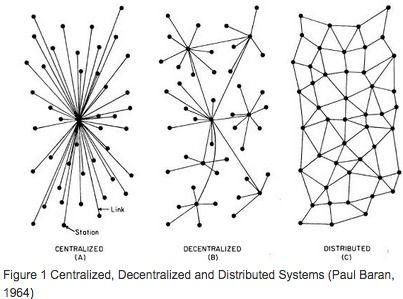Vannevar Bush’s prediction, half a century later, rings true: “The world has arrived at an age of cheap complex devices of great reliability; and something is bound to come of it.”


Vannevar Bush’s prediction, half a century later, rings true: “The world has arrived at an age of cheap complex devices of great reliability; and something is bound to come of it.”

After Spencer Kimball left Google, he found himself missing some of the custom-built software the company uses internally. So he and a bunch of fellow ex-Googlers started building their own. And now they want to make it available to everyone to power the next Google or Facebook.
Specifically, Kimball wanted something like Google’s database system Spanner. Spanner is designed to juggle data between potentially millions of database servers, a tool that keeps Google’s services online even if several servers, or an entire datacenter, go offline. While few companies need to operate at quite the scale Google does, the ability to stay online even if many systems fail, and to automatically balance resources between servers, would be useful to many other companies. Read more

Kyle VanHemert — WiredJaanus Kase isn’t sure we should teach every kid to code.
Wait, don’t grab your pitchfork just yet. He thinks it’s a perfectly noble idea, just that it ignores a basic fact: Programming as it exists today is tedious and a highly specialized skill—one that, frankly, not everyone is well-suited to. “Saying that everybody is a programmer, everybody must code, it’s dangerous,” he says. “It trivializes the art of programming. And it is an art—a craft.”
Rather than teach everyone to code, maybe it makes more sense to build tools that let some people side-step programming altogether? Read more

Steve Lohr | The New York Times
“Many data quants see marketing as a low-risk — and, yes, lucrative — petri dish in which to hone the tools of an emerging science. ‘What happens if my algorithm is wrong? Someone sees the wrong ad,’ said Claudia Perlich, a data scientist who works for an ad-targeting start-up. ‘What’s the harm? It’s not a false positive for breast cancer.’…These questions are spurring a branch of academic study known as algorithmic accountability.” Read more
Samuel Arbesman — Aeon
My family’s first computer was the Commodore VIC-20. Billed by its pitchman, Star Trek’s William Shatner, as the ‘wonder computer of the 1980s’, I have many fond memories of this antiquated machine. I used to play games on it, with cassette tapes that served as primitive storage devices. One of the cassettes we bought was a Pac-Man clone that my brother and I would play. Instead of a yellow pie with a mouth, it used racing cars.
My most vivid memories are of the games whose code I typed in myself. While you could buy software for the VIC-20 (like the racecar game), a major way that people acquired software in those days was through computer code published in the pages of magazines. Want to play a fun skiing game? Then type out the computer program into your computer, line by line, and get to play it yourself. No purchase necessary. These programs were common then, but no longer. The tens of millions of lines of code that make up Microsoft Office won’t fit in a magazine. It would take shelves-worth of books.
Read more

Steve Jones, Global vice president of big data, Capgemini — Quartz
Can an algorithm be racist? It’s a question that should be of concern for all data-driven organizations.
From analytics that help law enforcement predict future crimes, to retailers assessing the likelihood of female customers being pregnant (in the case of Target, without their knowledge), the increasing scale of computer cognizance is raising difficult ethical questions for business.

By Jason Dorrier — SingularityHub
Last year, Elon Musk and Stephen Hawking admitted they were concerned about artificial intelligence. While undeniably brilliant, neither are AI researchers. Then this week Bill Gates leapt into the fray, also voicing concern—even as a chief of research at Microsoft said advanced AI doesn’t worry him. It’s a hot topic. And hotly debated. Why?
In part, it’s because tech firms are pouring big resources into research. Google, Facebook, Microsoft, and others are making rapid advances in machine learning—a technique where programs learn by interacting with large sets of data.
Quoted: “Legendary cyberculture icon (and iconoclast) R.U. Sirius and Jay Cornell have written a delicious funcyclopedia of the Singularity, transhumanism, and radical futurism, just published on January 1.” And: “The book, “Transcendence – The Disinformation Encyclopedia of Transhumanism and the Singularity,” is a collection of alphabetically-ordered short chapters about artificial intelligence, cognitive science, genomics, information technology, nanotechnology, neuroscience, space exploration, synthetic biology, robotics, and virtual worlds. Entries range from Cloning and Cyborg Feminism to Designer Babies and Memory-Editing Drugs.” And: “If you are young and don’t remember the 1980s you should know that, before Wired magazine, the cyberculture magazine Mondo 2000 edited by R.U. Sirius covered dangerous hacking, new media and cyberpunk topics such as virtual reality and smart drugs, with an anarchic and subversive slant. As it often happens the more sedate Wired, a watered-down later version of Mondo 2000, was much more successful and went mainstream.”
Read the article here >https://hacked.com/irreverent-singularity-funcyclopedia-mondo-2000s-r-u-sirius/
Quoted: “Tony Williams, the founder of the British-based legal consulting firm, said that law firms will see nearly all their process work handled by artificial intelligence robots. The robotic undertaking will revolutionize the industry, “completely upending the traditional associate leverage model.” And: “The report predicts that the artificial intelligence technology will replace all the work involving processing information, along with a wide variety of overturned policies.”
Read the article here > https://hacked.com/legal-consulting-firm-believes-artificial…yers-2030/

Quoted: “If you understand the core innovations around the blockchain idea, you’ll realize that the technology concept behind it is similar to that of a database, except that the way you interact with that database is very different.
The blockchain concept represents a paradigm shift in how software engineers will write software applications in the future, and it is one of the key concepts behind the Bitcoin revolution that need to be well understood. In this post, I’d like to explain 5 of these concepts, and how they interrelate to one another in the context of this new computing paradigm that is unravelling in front of us. They are: the blockchain, decentralized consensus, trusted computing, smart contracts and proof of work / stake. This computing paradigm is important, because it is a catalyst for the creation of decentralized applications, a next-step evolution from distributed computing architectural constructs.
Read the article here > http://startupmanagement.org/2014/12/27/the-blockchain-is-th…verything/